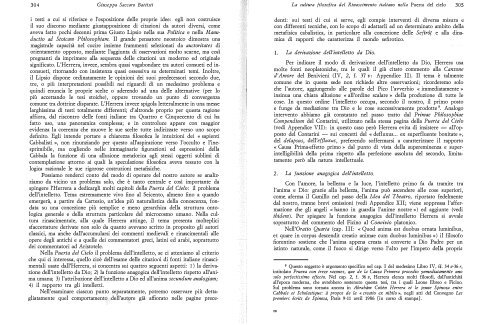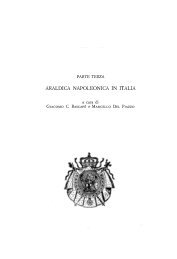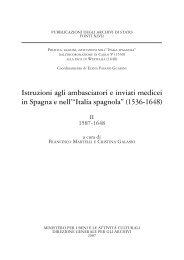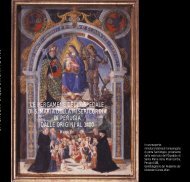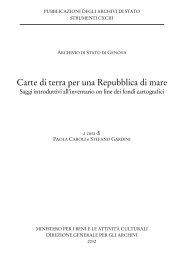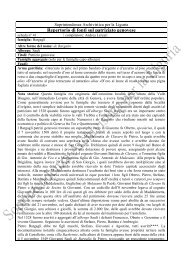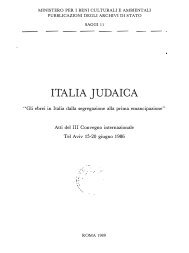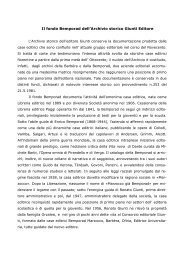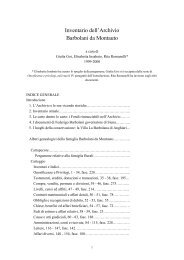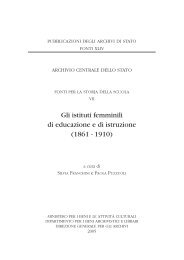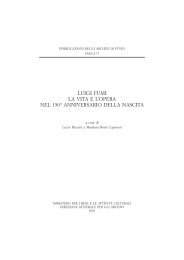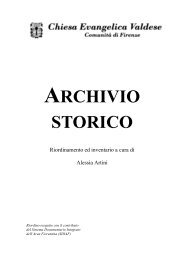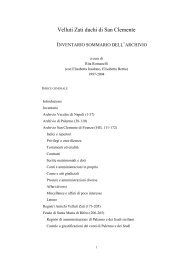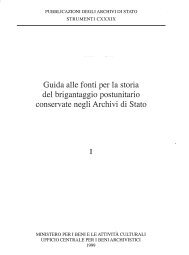ITALIA JUDAICA - Direzione generale per gli archivi
ITALIA JUDAICA - Direzione generale per gli archivi
ITALIA JUDAICA - Direzione generale per gli archivi
You also want an ePaper? Increase the reach of your titles
YUMPU automatically turns print PDFs into web optimized ePapers that Google loves.
154 Abraham Melamed<br />
work to the history of Turkey and France 55• W e can also find scattered information<br />
on generai history in Don Isaac Abravanel's commentary to the Bible 56,<br />
in Gedalya Ibn Yahia Shalshelet ha'Kabbala 5\ in Luzzatto's Discorso as<br />
well as in other sources. Some of these writers greatly praised the contemporary<br />
gentile nations and governments they described, notably Abravanel,<br />
Capsali and Luzzatto w ho praised the Venetion Republic 5 8 •<br />
Likewise, there was an increased interest in ancient non-Jewish history,<br />
mainly Hellenistic and Roman, which is to be found in the works of Abravanel,<br />
Azariah de' Rossi, Ibn Y ahia, Abraham Portaleone, Luzzatto, Leone da Modena<br />
and others 59• Again, this interest in ancient history always concerned<br />
nations which influenced Jewish history.<br />
A correlated phenomenon was renewed interest in the ancient history of<br />
the Jewish people itself. While Italian humanists attempted to uncover their<br />
presumed ancient historical and cultural roots in the Greek and Roman past,<br />
Jewish scholars correspondingly attempted to rediscover their own classica!<br />
heritage 60•<br />
One of the novelties of sixteenth century Jewish history was the attempt<br />
to create a coherent survey of the whole of Jewish history. It is meaningful<br />
in this respect that the interest of Jewish scholars in their ancient history was<br />
mainly devoted to the history of the <strong>per</strong>iod of the Second Tempie. This can<br />
55 J. HA'CoHEN, Se/er Divrei ha'Yamim le'Malkey Zar/at u'Malkey Bet Ottoman<br />
ba'Togar, Amsterdam 1733; Y. H. YERUSHALMI, Clio and the Jews ... eit., p. 625; A. DAvm,<br />
R. Gedalya Ibn Yahia ... eit., p. 64.<br />
56 A. NETANYAHU, Don Isaac Abravanel, Statesman ... eit., II, p. rv. See also SEGAL,<br />
R. Isaac Abravanel betor Parshan ha'Mikra, in « Tarbitz », 8 (1937), pp. 272-273.<br />
In Abravanel's Ma'yene ha'Y eshuab, whleh is a eommentary on the Book of Daniel, there<br />
is a long diseussion of Roman, Christian and Muslim history. SEGAL, R. Isaac Abravanel betor<br />
Parsban ... cit., pp. 274-275. More references to Medieval Christian history ean be found, for<br />
ìnstanee, in the commentaries to Isaiab, 34, Jeremiah, 49, and Obadiah, ibid., pp. 275-276.<br />
57 G. IBN YAHIA, Sbalshelet ha' Kabbalab, Venice 1587; A. DAvm, Mifalo ba'<br />
Filosofi shel Gedalya ibn Yabia, Ba'al Sbalshelet ha'Kabbalah, unpublished doctoral dissertation<br />
at the Hebrew University of Jerusalm in 1976, eh. 4; In., R. Gedalya Ibn Yabia ... eit.,<br />
pp. 63-66; Y. H. YERUSHALMI, Clio and the Jews ... eit., p. 625.<br />
58 A. MELAMEn, The Myth of Venice . .. cited.<br />
59 For instanee: in Abravanel (see I. BAUER, Don Isaac Abravanel ve' Yahaso ... eit.,<br />
pp. 245-249; L. RABINOWITZ, Abravanel as Exegete, in Isaac Abravanel, Six Lectures, eds<br />
TREND and LoEWE, Cambridge 1937, p. 79); in Ibn Yahla (see A. DAVID, Mi/alo ... cit., eh. 4;<br />
In., R. Gedalya Ibn Yahia ... eit., pp. 64-65); in Azariah (see S. W. BARON, Azariah de'<br />
Rossi's Attitude ... cit., pp. 36-37); in Ibn Verga (see A. A. NEUMAN, Tbe Shebeth Yehudab ...<br />
dt., p. 272). See also nn. 62, 63.<br />
so Baron argues that de' Rossi's concentration on ancient history can not be attributed<br />
to Renaissanee historiography, sinee most Renaissanee historians dealt with eontemporary<br />
. history, S. W. BARON, Azariah de' Rossi's Historical Method ... cit., pp. 207-208. However,<br />
it is obvious that de' Rossi, like other eontemporary Jewish thinkers, was influenced by<br />
the generai humanist admiration of the classica! past and the strong antiquarian interests<br />
of late Renaissanee thinkers. Even Italian historians who wrote only contemporary history<br />
were influeneed in their methods, eoneepts and literary style by classica! authors.<br />
The Perception of Jewish History in Italian Jewish Thought 155<br />
be partially explained by the influence of Renaissance historiography. The<br />
history of the Second Tempie <strong>per</strong>iod is the Jewish chronological equivalent of<br />
Greek and Roman history which so much fascinated Renaissance scholars.<br />
Another manifestation of the influence of the renewed interest in classica!<br />
history is the fact that towards the end of the sixteenth century, J ewish scholars<br />
became more and more familiar with classical pagan authors and quoted<br />
them extensively in their historical arid ·other writings. In his Meor Einaim,<br />
Azariah de' Rossi quotes, among others, Homer, Plato, Pythagoras, Aristotle,<br />
Plutarch, Pliny, Curtius, Cicero, Quintilian, Tacitus, Dio Cassius and Livy 61•<br />
Extremely important in this respect is the fact that de' Rossi was the fìrst<br />
Jewish author to quote extensively from the writings of the two most important<br />
Hellenistic Jewish authors, who were hardly known to Medieval Jewry -<br />
Philo of Alexandria 62 and Josephus Flavius, whose history was considered to be<br />
the Latin version of the Hebrew Book of Y osifon and was called in Hebrew<br />
" c,-, po, » i.e. T be Latin Yosifon 63•<br />
Abraham Portaleone, in his encyclopaedic and antiquarian Shiltei ha'Gibborim<br />
(Mantua, 1612), which deals with the structure of the Tempie and<br />
divine service therein, mentions Aristotle, Livy, Sallust, Vergil, Lucan, Vitruvius,<br />
Terence, Plautus, Pliny and others 64• Luzzatto, in his Discorso quotes,<br />
among others, Plato, Aristotle, Cicero, Curtius, Vergil, Thucidides, Vegetius,<br />
Strabo, Josephus Flavius, and, as already mentioned, Tacitus 65•<br />
The Jewish authors even followed Renaissance historiographic fashion.<br />
In the beginning of Renaissance historography, Livy was reguarded as the greatest<br />
classica! historian, the supreme example to be emulated. By the late<br />
sixteenth century he was replaced with Tacitus 66• Likewise, among the Jewish<br />
authors, we find Azariah de' Rossi giving the greatest praise to Livy: .,,o;, "<br />
" ,;,,;:, ;, " N:l Ci' N c,;, "il.' ,-,nN, , -,!VN ... c,,-, ,.,;, . « The<br />
greatest Roman writer ... among the Gentil es none greater preceded or followed<br />
6 1 A. DE' Rossr, Meor Einaim ... cit., part I, pp. 2, 9, 10, 15, 90, 97, 105, 130, 224, 226,<br />
232, 250, 254; part II, pp. 4, 110, 150, 153, 175, 186, 187, 193; S. W. BARON, Azariah de'<br />
Rossi's Historical Method ... cit., pp. 227-229.<br />
62 A. nE ' Rossr, Meor Einaim ... cit., I, pp. 2, 76, 82, 225 e passim; S. W. BARON,<br />
Azariah de' Rossi's Attitude ... cit., p. 13, n. 4, p. 15. In., Azariah de' Rossi's Historical<br />
Method ... cit., pp. 222-223.<br />
63 A. DE' Rossr, Meor Einam ... cit., I, pp. 2, 14, 17, 76, 97, 112; S. W. BARON,<br />
Azariah de' Rossi's Attitude ... cit., p. 223; in Abravanel (see SEGAL, R. Isaac Abravanel ...<br />
cit., pp. 272-273 and L. RABINOWITZ, Abravanel as Exegite ... cit., p. 80); in Ibn Yahia<br />
(see A. DAVID, Mi/alo .. . cit., pp. 66-69). On the popularity of Josephus in Renaissanee<br />
historiography, see P. BuRKE, A Survey ... cit., pp. 136-137 .<br />
64 A. PoRTALEONE, Shiltei ha'Gibborim, Mantua 1612, pp. 4a, 36a, 38a, 42a. See<br />
also chs. 78, 81.<br />
65 In numerous plaees.<br />
66 P. BURKE, A. Survey ... eit., pp. 137, 146-151; G. SPINI, The Art of History ... eit.,<br />
pp. 123-125; S. W. BARON, Azariab de' Rossi's Attitude ... eit., p. 43.


